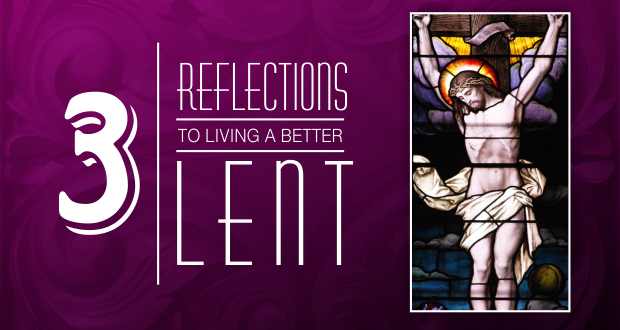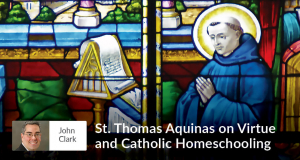Unless you do penance you will likewise perish… (Lk. 13:3)
Inquisitive young people have often asked, “What is the purpose of doing penance in Lent?” Some have been told that the whole notion of penance is a medieval idea to make us believe that we are evil.
Those who seem to disagree with all traditional Catholic policies would no doubt teach such errors, but the truth of the matter is that the underlying purpose of penance is to learn to put our lower nature under control—to take control of our emotions and actions.
Learning How to Eat – Again.
Diets are the great American fad of today. Penance for Catholics is simply a spiritual diet. Some people diet to lose weight. The process can be somewhat of a torture, but people do it to achieve a strong, healthy body. It is done to achieve an earthly goal. We would never tell a friend to eat, drink, and be merry and to forget his weight problem. Why then do people ridicule the Catholic Church when it prescribes penance to teach us how to say no to sin and to be able to control our lower appetites?
Penance is saying no to an over-indulgent body which wants to smoke, over-eat and over-drink. Penance is learning how to say no to certain things in order to say no to the daily temptations which are all around us. Some of these things can be good in themselves, but we must learn to use them in moderation; or, if they are evil, to say no to them outright. The modern consensus is to belittle any restriction. The world says, “Do as you please.”
Dieters are told to re-learn how to eat. Sinners must be told how to re-think life, to eliminate those actions that have brought sin and guilt into their lives. This is the purpose of penance in Lent.
We would applaud an athlete who brings down his weight to make the football team or to make a certain weight level in wrestling. We would cheer on a friend who decided to give up smoking or end his drinking habit. We certainly would not try to convince such a one that he was torturing himself. We would endeavor, rather, to encourage such a friend to root out any bad habits from his lower nature so as to be in control of his life. This is exactly the rationale behind Lent.
Little Sacrifices Pay Off
As we grow older, we have to make decisions in our lives. If we have indulged ourselves in pandering to every desire that crossed our mind when we were young, it will be difficult in later life to face the idea of giving up cravings of the body or mind which could be harmful to us or, worse yet, sinful. Those who, in conformity with Church law, practice Natural Family Planning, would tell us that self-control is a big factor in being faithful to Church teaching on the subject. Thus, little sacrifices of our younger years become the resounding no’s of our mature years—“No, I will not sin.”
A good psychologist would remind us that a habit is formed by a repetition of acts over and over so that, so to speak, a button is pushed and the action is continued until closure occurs. The same is true when we wish to erase a bad habit. The opposite virtue must be practiced until it supplants the evil habit. It takes willpower, and willpower is developed only when we are in charge—and it often requires saying no. Lent is a time to learn how to say no.
If we are overweight we say no to the foods which contain fat. To eliminate sin, we must stay away from persons, places, or things that may lead us into sin. The Church has rightly called these “occasions of sin.”
Let us be careful not to get too close to the edge of the cliff lest we fall over it. Let us not get too close to the flame of concupiscence lest we be devoured in it. Lent tells us loudly and clearly, “Stay away from temptation; practice the opposite virtues of your faults and sins.” Daily Mass in Lent and frequent confession are great helps. Lent, too, should have a positive side. Saying no is the negative and necessary part; saying yes to good works is the positive side.
Children can be positive by doing their work without being told over and over again. They can make their beds, stop arguing, put their toys away and do the things their parents tell them right away. This is a wonderful sacrifice and it brings peace to the family.
The Charity of Almsgiving
One of the traditional activities for Lent is almsgiving. In many dioceses, the Bishop issues an annual appeal for financial support during Lent. Even in these difficult economic times, almost every family can spare a few dollars to support the Church. Parents can encourage their children to give some small part of their own money, not only to support the Church, but also as a hedge against materialism.
Lent is also a time for remembering that we must make up for past sins so that we will have very little to atone for in the next world. We can receive a plenary indulgence every day. An indulgence is a remission in whole or in part of the temporal punishment due to our sins. In modern days, many have disregarded the idea of making up for their sins, but you home schooling parents know better! We must always make reparation for past sins.
St. Peter tells us, “Charity covers a multitude of sins.” (I Peter 4:8) Kindness to family, kindness to those we work with—especially kindness to those who hate us—can help us to be holy.
The Oscar Wilde book The Picture of Dorian Gray is an unusual one. It tells of a man who was so taken in by his own good looks that he had a portrait done of himself. He then began to lead a sinful, lustful life. He became disgustingly evil. He never grew older outwardly, but his portrait began to grow older and horribly deformed. This is what happens to a sinful soul. Sin does not necessarily show on our outside, but it surely disfigures the soul. Wouldn’t it be interesting to see how our soul appears to God? Perhaps we are better off not to know, but just in case it is in need of spiritual plastic surgery, how about going on a spiritual diet this Lent? It just could be the greatest decision of your eternity.

 Seton Magazine Catholic Homeschool Articles, Advice & Resources
Seton Magazine Catholic Homeschool Articles, Advice & Resources












































